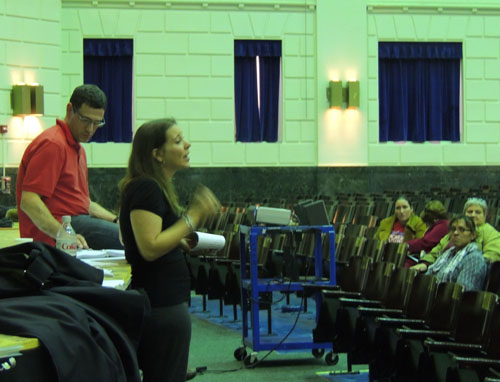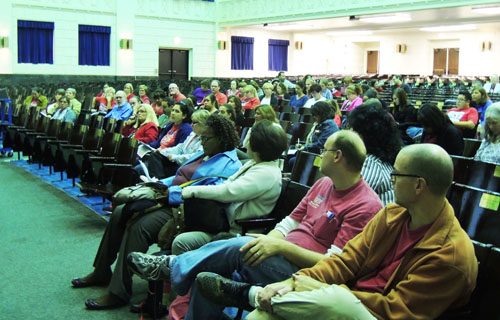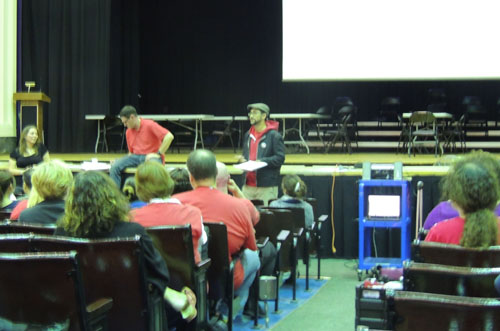Voting to take place in all real Chicago public schools on Tuesday October 2... CTU leadership ends week of contract meetings on tired but upbeat note
The officers and staff of the Chicago Teachers Union ended a week of after-school meetings explaining the proposed contract (officially the "Tentative Agreement") to the union's members on Friday, September 28, 2012, at Roosevelt High School on the city's northwest side. Despite the fact that it was a Friday and by many accounts a very long week in the schools, more than 120 teachers and other union members attended the meeting to hear the proposed contract explained to them and to get answers to the hundreds of questions that still remain about the deal that suspended the seven-day strike on September 19.
 Chicago Teachers Union Financial Secretary Kristine Mayle explained large portions of the proposed agreement, including the controversial "Wellness" program, to the more than 120 union members who came to the final meeting of the week at Roosevelt High School on September 28, 2012. With Ms. Mayle (above left) was CTU Vice President Jesse Sharkey. Substance photo by George N. Schmidt.At the September 28 meeting, the union's vice president, Jesse Sharkey, and financial secretary, Kristine Mayle, took most of the questions about the proposed agreement, while other union staff members went over portions of the proposed deal with those they represent. (For example, PSRPs after hearing the general presentation went to another part of the vast auditorium to go over the contract with June Davis and other union staff while the general questions from teachers continued in the main auditorium).
Chicago Teachers Union Financial Secretary Kristine Mayle explained large portions of the proposed agreement, including the controversial "Wellness" program, to the more than 120 union members who came to the final meeting of the week at Roosevelt High School on September 28, 2012. With Ms. Mayle (above left) was CTU Vice President Jesse Sharkey. Substance photo by George N. Schmidt.At the September 28 meeting, the union's vice president, Jesse Sharkey, and financial secretary, Kristine Mayle, took most of the questions about the proposed agreement, while other union staff members went over portions of the proposed deal with those they represent. (For example, PSRPs after hearing the general presentation went to another part of the vast auditorium to go over the contract with June Davis and other union staff while the general questions from teachers continued in the main auditorium).
The union's 26,000 active duty members will be voting on the proposed agreement in all of the city's real public schools on October 2, 2012, and the results of the voting are expected to be announced by the union's officers following a meeting of the union's Rules-Elections Committee the following day.
The Roosevelt High School meeting went into much of the detail of the Proposed Agreement which is to be voted on by the union's members across the city on October 2. Although most of the language of the Proposed Agreement has been posted on line on the union's website (www.ctunet.com) for several days, because of the complexity of the revisions to the old agreement, some of the details were still being worked out during the last week of September. For example, because the Board of Education has the exclusive legal power to establish the school calendar, the Board was to sole entity responsible for the announcement on September 27 of the new calendar. Union officials noted that some of the union's suggestions about the calendar, which includes making up the seven school days missed during the strike, did not take into account suggestions made by the union.
The Proposed Agreement, which runs to 53 pages, is not only available on line, but in print. At the Roosevelt High School meeting, Jesse Sharkey told the meeting that problems with the printer had resulted in only about half the schools receiving copies of the printed document prior to the end of school on September 28. The printer has assured the union that the remainder of the schools will receive the document by October 1 and has apologized to union officials for the problems. Because of the combination of electronic and print media necessary for communications such as the Proposed Agreement, many of the union's members and delegates had a great deal of information, while those who rely primarily on print had less. Copies of highlights of the Proposed Agreement had been available at all the meetings between September 24 and September 28.
 Some of the union members who attended the contract meeting at Roosevelt High School on September 28, 2012. By 5:00 a Substance count of the crowd showed it to be a little more than 120 people. As at the other meetings during the week, people came and went during the reports and discussions. Substance photo by George N. Schmidt.Despite the fact that the proposed agreement institutes the most extensive and positive revisions to the contract in over 35 years, there has been some controversy in the schools leading up to the vote. Some of that was reflected in the questions that came up during the five days of after-school meetings.
Some of the union members who attended the contract meeting at Roosevelt High School on September 28, 2012. By 5:00 a Substance count of the crowd showed it to be a little more than 120 people. As at the other meetings during the week, people came and went during the reports and discussions. Substance photo by George N. Schmidt.Despite the fact that the proposed agreement institutes the most extensive and positive revisions to the contract in over 35 years, there has been some controversy in the schools leading up to the vote. Some of that was reflected in the questions that came up during the five days of after-school meetings.
One of the most serious issues arose when teachers at one southwest side high school actually began telling others that they were planning to file in court for an injunction to block the October 2 vote, claiming, falsely, that it was a "violation of the CTU Constitution."
According to the version of reality that was suggested as part of that narrative, the CTU Constitution "required" that the proposed contract go to the members with a recommendation from the House of Delegates. Although the House of Delegates on September 18 voted to suspend the strike (the strike can only be ended by a vote to ratify the proposed contract), the House did not make any recommendation on the contract itself.
A number of teachers were misled, for a time, into believing that the recommendation was a requirement of the union "Constitution."
The Constitution, which is available on line, is clear:
As one delegate said: "If we aren't already, we're all going to need to be experts in both the new contract and the CTU Constitution. So here it is, for those who haven't looked it up (a link is on the CTU website, under the "Delegates" tab at the top of the page):
ARTICLE IX: DUTIES OF THE HOUSE OF DELEGATES
Sec. 7: The House of Delegates shall use the following procedures to suspend a strike and recommend acceptance or rejection of a proposed tentative Union-Board contract:
a. The House of Delegates shall have the authority to suspend a strike;
b. Within 10 school days after such postponement, the membership shall vote in a secret ballot referendum on acceptance (or rejection) of the tentative agreement. If the membership accepts the proposed tentative agreement, the strike shall be automatically ended;
c. If the membership rejects the proposed tentative agreement, a special meeting of the House of Delegates shall be convened within five days of the referendum vote to set a date for the resumption of the strike.
 Union organizer Matt Luskin (above standing, wearing his trademark hat) told the Roosevelt High School meeting that the struggle to organize in every school was just beginning, and that although the union's staff would continue to support the delegates, the delegates and members (including the members of each school's Professional Problems Committee) would have to continue to work to enforce union power and the contract at each of the system's more than 600 real public schools. Substance photo by George N. Schmidt.There is no "requirement" that the House make a recommendation, nor has there been any tradition of such. In fact, the responses to the proposed contracts at various times in the union's history have been varied. On August 31, 2007, for example, then CTU President Marilyn Stewart called for the "Yes" votes in the House of Delegates on the motion to recommend the proposed agreement, but refused to call for the "No" votes and then adjourned the meeting and went to a press conference at which she told the media that the contract had been voted "Yes." Substance reported this extensively at the time.
Union organizer Matt Luskin (above standing, wearing his trademark hat) told the Roosevelt High School meeting that the struggle to organize in every school was just beginning, and that although the union's staff would continue to support the delegates, the delegates and members (including the members of each school's Professional Problems Committee) would have to continue to work to enforce union power and the contract at each of the system's more than 600 real public schools. Substance photo by George N. Schmidt.There is no "requirement" that the House make a recommendation, nor has there been any tradition of such. In fact, the responses to the proposed contracts at various times in the union's history have been varied. On August 31, 2007, for example, then CTU President Marilyn Stewart called for the "Yes" votes in the House of Delegates on the motion to recommend the proposed agreement, but refused to call for the "No" votes and then adjourned the meeting and went to a press conference at which she told the media that the contract had been voted "Yes." Substance reported this extensively at the time.
At other times in the CTU's long and fiercely democratic history, the House had been packed to produce a "Yes" vote, one as early as eight months prior to the expiration of the previous contract.
Despite the confusion, at the close of business on September 28, 2012, the union had not been served with any lawsuit asking for an injunction barring the October 2 vote.
During the five days of after-school meetings, nearly 1,000 union members came, and many asked questions. One of the meetings, according to the union officers, lasted until 7:30 p.m. (Marshall High School on September 27). The complexity of the proposed contract and the intensity of the fight to achieve it both added to the questions. Although some of the questions were clearly hostile and came from union factions now maneuvering to return to power, the vast majority of the questions heard by Substance reporters dealt with the complex issues being clarified in the proposed agreement.


By: Anthony Smith
Thank you Karen, Jesse, Kristine, and OUR Union team!
As you talk about the Democratic Process of our Teachers Union I have to say that I have deep respect for Karen Lewis. The transparency (proposed by our Mayor Rahm Emanuel but not followed through with) which Karen Lewis has modeled for all of us as our leader is something that should be encouraged for all Unions and especially for our political leadership throughout our country.
Utilizing the skills and depth of 35 of our members Karen shows us that the days of backroom Chicago style political deals are gone, at least while she is in charge.
I may not be keen on the contract for several reasons, but I admire and respect the leadership of Karen, Jesse, Kristine and the rest of OUR team!
I no longer worry that some kind of deal will be worked out between our Union leadership and the powers that be. I have often wondered about Marilyn Stewart's style and backroom deals that seemed shortsighted at best and a total sell out at worst.
Democracy, as those of us who attempt to live it and implement it, is often slow, ponderous, frustrating, and sometimes not so pretty. But I can't think of another style of government that would be better.
And the Chicago Teachers Union has proven that!
So, thank you Karen, Jesse, Kristine, and the rest of OUR team for all of your incredibly hard work, patience, intellect, determination, perseverance, levelheadedness, organizational skills, media interaction, and in general for just being excellent role models for all of us!